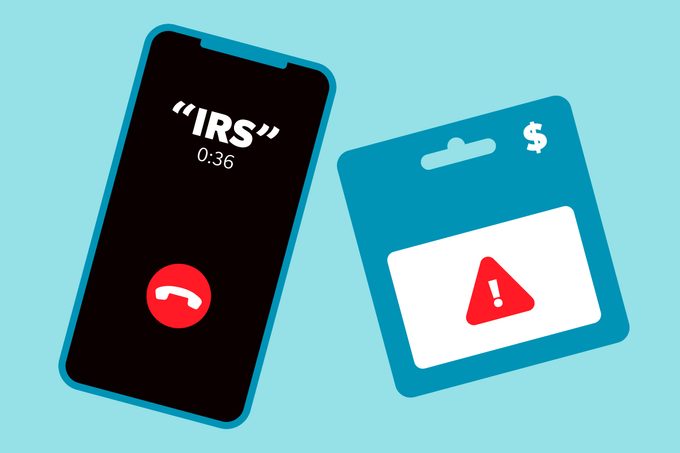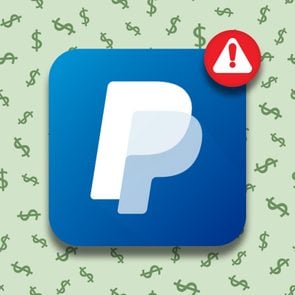Gift Card Scams: What They Are and How to Avoid Them
Updated: Mar. 14, 2024

Your credit card isn't the only item in your wallet that scammers love. Watch out for these gift card scams that could put you and your money at risk.
If you plan to purchase a gift card in the near future, beware: Scammers are now using them to swipe your money. A study by the Better Business Bureau (BBB) found that gift card scams nearly tripled between 2017 and 2020, making them the second-highest type of fraud behind credit cards.
As with a wide range of phone scams and online scams, from Amazon scams (including Amazon email scams) to Cash App scams and even brushing scams, scammers’ tricks are getting more convincing by the day. “Perpetrators prey on their victims by exploiting our tendency to trust people,” says Randy Pargman, vice president of counterintelligence at Binary Defense, a cybersecurity company. These scams can also do serious damage to your wallet. The Federal Trade Commission (FTC) reports that consumers lost a total of $233 million to fraudsters in 2021, thanks to gift card scams.
That said, you shouldn’t avoid gift cards altogether just because of the rising numbers of scams. “As long as you do your homework and are educated on these types of scams,” says Eva Velasquez, president and CEO of Identity Theft Resource Center, “you should be able to spot one.”
So, what do gift card scams look like, and how can you avoid them? We got the scoop from experts in tech security so you can protect yourself—and your money.
Get Reader’s Digest’s Read Up newsletter for more tech, humor, cleaning, travel and fun facts all week long.
How do gift card scams work?

There are two common types of gift card scams, according to experts. The first involves trying to trick you into paying an impostor with gift cards. You may receive a phone call or text message from someone claiming to be the police, the IRS or a government official, demanding that you pay a fee or debt by purchasing gift cards and sending them the information on the back. In the second type of scam, fraudsters will sell you fake gift cards at discounted prices online. Although buying gift cards used instead of new can save you money, consumers should keep a close eye out for gift card scams and other common shopping scams on person-to-person sales sites like Facebook Marketplace and eBay.
Common gift card scams
Government impersonation scams
You might be surprised by what a scammer can do with just your cell phone number. In one common gift card scam, cybercriminals place a call or send a text message to the victim, claim to be a government agency or authority figure (such as the IRS, Social Security, the FBI or a state or federal health department) and tell them that they owe taxes and must pay the fine immediately with gift cards to avoid further penalties or even jail time.
Tech support scams
Another gift card scam hooks its victims by impersonating a tech support company and requesting gift cards as payment. The scammer might call, text or email a victim to warn them that a problem or suspicious activity has been detected on their computer and then convince them to pay for new or upgraded service with a gift card. Typically, the criminal will request gift cards from a specific retailer and ask the victim to provide them with the PINs, which they can use to buy items online, according to Velasquez.
Utility company scams
Utility company scams are similar to tech support scams. In this one, a criminal poses as an electricity, gas or water company, contacts the victim by phone or email and informs them that they have overdue bills that need to be paid with a gift card. If the victim doesn’t pay right away, the scammer threatens to cut off their service, Velasquez says.
Discount gift card scams
Discount gift card scams are some of the most frequent schemes criminals use to rip people off, according to Pargman. After victims purchase a discounted gift card from online or in-person dealers, they will find that the card has no balance or a lower balance than advertised. “In some cases, these cards may also be stolen, which means you could be unwittingly involved in a fraudulent scheme,” Pargman adds.
Computer hostage scams
With a computer hostage scam, fraudsters stand to gain two prizes: gift cards and your banking information, which could leave you vulnerable to bank scams and wire fraud. The attacker uses malware to take over a victim’s computer and lock them out until they pay a ransom in gift cards. If the criminal can view the victim’s computer screen, they may also require them to enter their bank account login or routing information on the screen so they can capture it.
CEO request scams
Got a message from your company’s CEO asking you to purchase gift cards for a client right away? It’s likely a phishing scheme. In this popular gift card scam, fraudsters use phone numbers or emails that appear to be from a legitimate source like a boss or CEO, but are actually spoofing accounts designed to trick employees into sending them gift cards. “Cybercriminals are banking on the fact that the victim won’t want to ask the CEO any questions or challenge their request, and they will quickly do as they are told,” Pargman says.
Stolen number scams
Sometimes, criminals will even steal the PINs off the back of gift cards that are still in the store. When the card is loaded with funds by an unsuspecting victim, they will enter the card number either online or in-store and make purchases with the money.
Popular gift cards used for scams
All gift cards are not created equal in scammers’ eyes. “Scammers are increasingly picky about which gift cards they want,” according to Pargman. A report by the FTC found that Target gift card scams are twice as popular with scammers as any other brand. Google Play gift card scams, Apple gift card scams, eBay gift card scams and Walmart gift card scams were also among the preferred choices for fraudsters (though you should watch out for Amazon gift card scams).
Why, you ask? For starters, these stores are large or online retailers, making it easy for victims to purchase the cards and scammers to use them. They also sell valuable or desirable merchandise—such as tech products or even baby formula—that a scammer can buy with the gift card and then resell on the black market for a profit, Pargman says.
How do gift card scams make money?
In most cases, scammers who convince you to send them gift card numbers will immediately use the cards to buy items or resell the cards to someone else. Buying a stolen or fraudulent gift card online, on the other hand, delivers money straight to the criminal’s bank account. “Quite often, the seller had very little cost to obtain the gift card that they sold you, so most or all of the money you pay for the gift card is pure illicit profit,” Pargman says. That’s why you should never purchase a discounted gift card from a private seller you don’t know (or fall for these other sneaky “deals” that are actually money scams).
Gift card scam red flags
- Urgency from someone asking you to buy a gift card is a telltale sign of a scam. In many schemes, like utility company or tech support scams, fraudsters will “try to convince you that you have to act urgently or dire consequences will occur,” according to Pargman.
- If someone tells you to buy a gift card from a specific store, that’s another red flag, experts say. You should especially be wary if they request gift cards from popular retailers like Target, Walmart or eBay.
- Other gift card scams look like deals that are too good to be true, such as a $100 gift card on sale for $50. “It’s best to pass up these offers and not get left holding a worthless card, or worse—giving it as a gift to a loved one who finds out later that it is worthless,” advises Pargman.
- Beware of anyone claiming that you owe money to the IRS or any other organization and insists that you pay with a gift card. No legitimate government agency, financial institution or company will ask you to pay them with gift cards, says Velasquez.
- When purchasing a gift card, check the packaging for any signs that it has been tampered with. A gift card that has been opened or had its PIN scraped off could be involved in a scam.
What to do if you’re a victim of a gift card scam
Unfortunately, you might not be able to recoup your lost money if you fall victim to a gift card scam. “Unlike a credit card, you cannot dispute a charge, and there is no guarantee the retailer will refund or return your money even if you make a fraud complaint,” Velasquez says. She recommends contacting the company you bought the gift card from to cancel the card, as well as calling the Identity Theft Resource Center to speak with an expert advisor. You should also report the theft to law enforcement and the FTC so they can track down the scammer.
How to avoid gift card scams
To protect yourself from gift card scams in the future, Pargman suggests ignoring calls or texts from anyone demanding that you pay for a fee, fine or other debt with gift cards. Buying gift cards for friends and family? Velasquez recommends sticking to reputable stores and checking the cards for any signs of tampering (like the PIN showing on the back) before purchasing them.
FYI, you should also ignore calls from any of these scam phone number area codes—they could be phony car extended warranty calls.
Sources:
- Better Business Bureau: “BBB Study: Gift cards are an increasingly popular tool for scammers”
- Randy Pargman, vice president of threat hunting and counterintelligence at Binary Defense
- Eva Velasquez, president and CEO of Identity Theft Resource Center
- FTC.gov: “Scammers prefer gift cards, but not just any card will do”
Next: Find out if gift cards expire.



